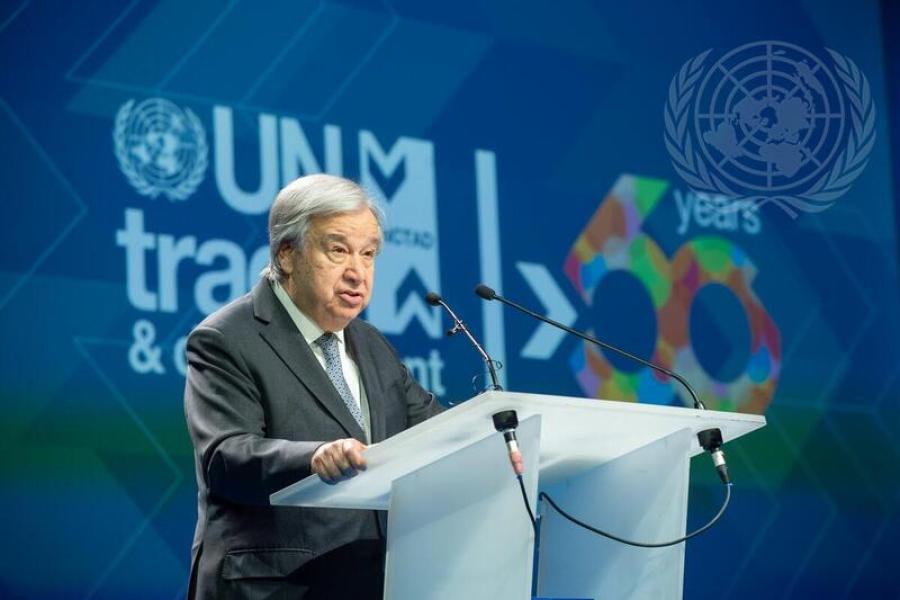Secretary-General: We Must ‘Reimagine a World Where Trade Is a Force for Shared Prosperity -- Not Geopolitical Rivalry’
20 June 2024

Following are UN Secretary-General António Guterres’ remarks to the Global Leaders Forum for the sixtieth anniversary of UN Trade and Development (UNCTAD), in Geneva on 12 June:
It is a great pleasure and a privilege to join you to commemorate the sixtieth anniversary of UNCTAD, now known as UN Trade and Development.
Sixty years ago, at a time of transformation and upheaval, UNCTAD was born out of the recognition that development is inextricably linked with trade.
The very first session of UNCTAD saw the signing of the Joint Declaration of the 77 developing countries -- the creation of the G77.
Indeed, UNCTAD and the Group of 77 were two parts of a joint endeavour: giving developing countries a greater voice in debates on development, and building a more development-oriented economic, financial and trade architecture.
UNCTAD has spent much of the past six decades championing the interests of developing countries and advocating for a more equitable and inclusive global trading system -- as a powerful engine for economic growth, poverty reduction and social progress.
UNCTAD’s commitment to this cause is reflected in its achievements. These include the creation of the least developed countries category; the adoption of the Principles and Objectives for a New International Economic Order; and the establishment of the Common Fund for Commodities.
UNCTAD also has a proud and longstanding record of contributing to discussions on reforming the international financial architecture. It has been a powerful force for change at the global level, shaping narratives, influencing international negotiations and advancing the cause of multilateralism.
UNCTAD’s work has not only created a legacy. It continues to be an inspiration for today’s debates and decisions.
The first Secretary-General of UNCTAD, the renowned Argentine economist Raúl Prebisch, once remarked that UNCTAD could not be neutral on development problems -- just as the World Health Organization (WHO) could not be neutral on malaria.
Today, the clarity and commitment of UN Trade and Development are more relevant than ever.
Geopolitical divisions are rising; inequalities are growing; the climate crisis is hitting many developing countries hard. And new and protracted conflicts are having a ripple effect across the global economy.
Global debt has soared while key development indicators, including poverty and hunger, have regressed.
The international financial architecture has been exposed as outdated, dysfunctional and unjust. It has failed to provide a safety net for developing countries mired in debt. And the international trading system is challenged on all sides; teetering on the verge of fragmentation.
Trade has become a double-edged sword: a source of both prosperity and inequality; interconnection and dependence; economic innovation and environmental degradation. In this context, I welcome the reforms to UNCTAD initiated by Secretary General Rebeca Grynspan.
Your new branding -- UN Trade and Development -- reflects a renewed commitment to expanding your reach and amplifying advocacy for developing countries.
Your role remains essential: identifying and working to close gaps and discrepancies in the system and proposing pragmatic, evidence-based solutions. This aspect of UNCTAD’s work was essential to the Global Crisis Response Group, created in 2022, and led by Secretary General Grynspan.
Above all, UN Trade and Development remains faithful to your core principle of promoting inclusive and sustainable development through trade and investment. And this is essential as multilateral cooperation is weakened and the forces of fragmentation grow stronger. New trade barriers introduced annually have nearly tripled since 2019 -- many driven by geopolitical rivalry, with no concern for their impact on developing countries.
The world cannot afford splits into rival blocs. The implementation of the Sustainable Development Goals (SDGs) and the need to ensure peace and security makes essential to have one global market and one global economy, in which there is no place for poverty and hunger.
The elimination of poverty remains the primary objective of sustainable development.
The International Monetary Fund (IMF) estimates that increased international trade restrictions could reduce global economic output by more than $7 trillion in the long term -- three times the annual output of sub-Saharan Africa.
It is becoming clear that we also need a new architecture of international finance, taxation and digital governance and a new vision of how to measure progress, how to promote South-South trade, and how to ensure stability in a multipolar world.
The Summit of the Future in New York in September will seek concrete progress and political momentum on these issues. This will be a unique opportunity to forge a new global consensus around addressing the complex economic and development challenges we face and turbocharging investment in the Sustainable Development Goals.
And the next three days will be an important milestone on the way to the Summit. I urge you to consider concrete, pragmatic contributions to this process.
We must channel the courage and wisdom of those who built UNCTAD, to reimagine a world where trade is a force for shared prosperity -- not geopolitical rivalry.
Where global supply chains are source of green innovation and climate action -- not environmental damage.
Where sustainable development is a central goal -- not an afterthought.
And where a networked and inclusive multilateralism, drawing on the expertise of the corporate sector, academia and civil society, is a means to realizing our shared ambitions -- not a relic of the past.
UN Trade and Development has an essential role in that world.
I look forward to welcoming you to New York to take forward your proposals and recommendations from this important Leaders Forum. And I congratulate UN Trade and Development once again on its important history, and its new, forward-looking agenda.
[END]

















